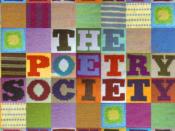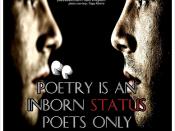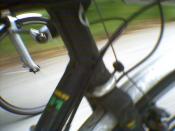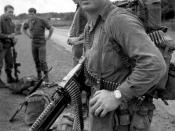An Analysis of 'Homecoming'In twenty-five lines of dramatic and saddening poetry, Bruce Dawe's "Homecoming" describes to the audience the tragedies of war, the return of the young bodies of the soldiers from the Vietnam War and the lack of respect that was given to these soldiers. Bruce Dawe was born 15 February 1930, he is an Australian poet who began writing poetry at the age of 13. He was influenced by writers such as John Milton and Dylan Thomas. Dawe's poetry revolves around Australian society, politics and culture.
The title "Homecoming" is used effectively to contrast the traditional universal implications of the word, with the shocking reality of dead soldiers flown home from Vietnam to grieving families. The word 'homecoming' usually implies a celebration or Heroic welcome for a great achievement, with a return to roots and family. However, the title has this return but with a saddening twist, because the homecoming described in the poem is related to death, mourning and loss with the arrival of a nameless body to a home country, this is quite different from the heartfelt joy extended to a loved one at a normal homecoming.
'All day, day after day, they're bringing them home'; 'they're bringing them in, piled on the hulls of grants, in trucks, in convoys'. The image of the amount of bodies being brought home is truly depicted here, these quotes show that the flow of bodies returning home from the was continuous every day hundreds of bodies were being brought home, none greeted with gratitude for the sacrifice they made, only the disappointed knowledge that they fought in a war for no reason.
A methodical production line of bodies is created with the use of "-ing" throughout the middle lines of the first stanza. "Bringing", "picking", "zipping", "tagging", and "giving" once again provide a horrible contrast between the living and the dead. Furthering this methodical sense is the repetition of 'they're', 'they're bringing them home', 'they're zipping them up', adding to the impersonal relationship between the bodies and their handlers.
The simile "whining like hounds" emphasizes the destructive characteristics of war, also depicting dogs as sympathetic feelers of human emotion. This relates to the image in the last stanza of the bodies only being greeted by mute dogs. For these dead soldiers, there is no big parade and music, only "the howl of their homecoming" from the plane. The world famous twenty-one gun salute is also used as a mocking of the soldiers, by the "mute salute" received from muzzled dogs who should have been yapping and barking. Further to this the soldiers are only greeted by dogs, who's worldwide concept is of being mans best friend, but they are silent and unfortunately cannot voice their grief in words.
Although these men have made the ultimate sacrifice by giving up their lives, the fact that they get no recognition for this act except from their dogs emphasizes the global concept of war as dehumanising. The final line of the poem creates the idea of an oxymoron, "They're bringing them home now, too late (because the chance to save their lives has now past), too early" (since all these soldiers are too young, leaving behind an unfulfilled life). Unfortunately these soldiers will also never receive the true recognition they deserve for their efforts that should have been given at the end of the war.
I think that the lack of full stops in this poem shows that the war was continuous and their was no time to stop and relax, I think that Dawe has successfully established and shown his views on war through his description of the events that followed the bodies of the soldiers as they returned home from the war.
BIBLIOGRAPHY:the poem 'Homecoming' by Bruce Dawe





